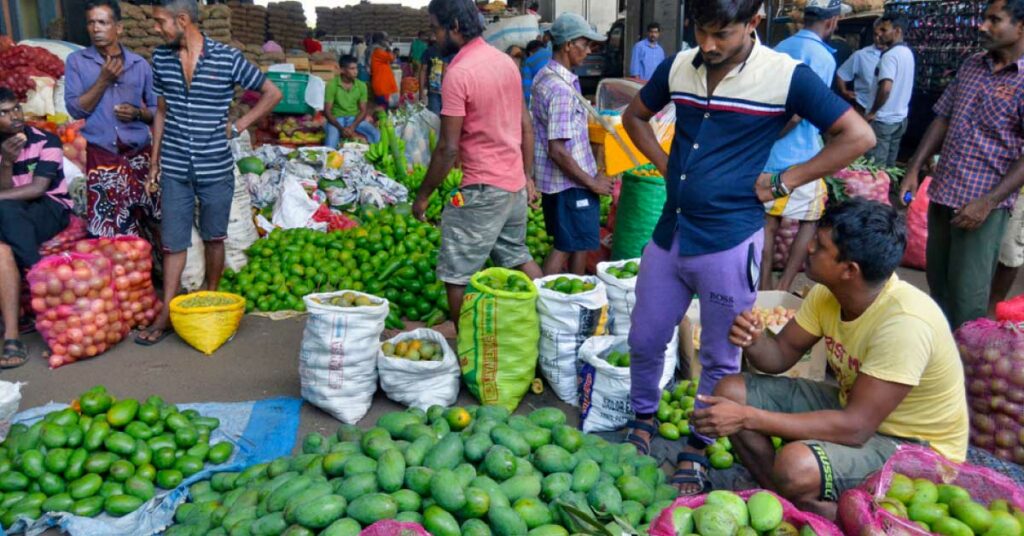The island-state of Sri Lanka saw a financial emergency declared on August 30th by the President, Gotabaya Rajapaksa. The president of Sri Lanka appointed Major General Niwunhella as the Commissioner General of Essential Services. The latter’s duty was to ensure that food items that were hoarded by private entities were seized. The emergency was declared to assist the government in establishing retail prices of essential goods at an affordable rate for the citizens.
The economic crisis prevalent in Sri Lanka is one of the primary challenges faced by its government. Amid the emergency, local traders and importers have portrayed their disapproval of the government’s way of executing the solution to the existing economic discrepancies.
Why is Sri Lanka facing a financial emergency?
A short supply of commodities has resulted in skyrocketing prices of items like rice, onions, sugar, potatoes, and kerosene oil. Citizens have been desperately queuing outside stores to stock up during the financial emergency. The peaking food rates and deficit supply of essentials have agitated the Sri Lankan citizens. Amid the growing state of affairs, the country has also been facing diminution in foreign exchange reserves.
This major shortage in supply is the result of private importers hoarding essential items, stated the Sri Lankan government. Major General Niwunhella, the Commissioner General of Essential Services, has commissioned officers to raid the privately held warehouses. According to the government’s estimates, approximately 13,000 tonnes of hoarded sugar were discovered in storage facilities outside Colombo. The government authorities are releasing the discovered items at regulated rates to the Sri Lankan markets.
President Gotabaya had earlier this year announced the ban of chemical fertilizers used in the agriculture sector. This move allowed the country to embrace the organic culture. However, the budding of this scheme has affected the production rates of staple food like rice and tea, which adds to the country’s growing economic problems.
Sri Lanka’s booming tourism sector has also seen a depreciation of income in recent years owing to the COVID19 pandemic. The rising prices of essential food commodities are also a result of the aftermaths of the pandemic. Tourism played a major role in foreign exchange earnings. According to the World Travel and Tourism Council, the industry of Tourism accounted for over 10% of the country’s GDP in 2019. The deficiency of tourists coming into the island resulted in a foreign exchange crisis. Forex reserves slipped and fell to just USD 2.8 billion in July 2021. It ebbed from a whopping USD 7.5 billion in November 2019.
The governor of the Central Bank of Sri Lanka, Weligamage Don Lakshman, will retire from his post on September 14th, 2021 as the country faces a forex dilemma. This crisis can prove to impend the country’s ability to service debt and import goods.
The governor’s announcement came after a briefing on 10th September 2021, when the South Asian Island nation suffered a depreciation of income and reserves, struggles of an extended lockdown, and imminent debt repayments. There was no successor named for the chair of the governor of the Central Bank of Sri Lanka.
Weligamage Don Lakshman discreetly stated in his briefing that he had originally intended to retire after he turned 80 in October 2021. He said his plans of retirement were dependent on his political-economic ideas and beliefs.
Lakshman stated that the COVID19 crisis has birthed a “period of disruption” in the country’s economy. He said that the Central Bank of Sri Lanka had to inject itself with resources for the betterment of the Sri Lankan people. The central bank is now focused on its budget and monetary reserves.
The dip in Sri Lanka’s forex reserves and the crash in the tourism industry has added doubt towards the nation’s capacity to attend to USD 1.5 billion of debt, due to maturity in 2022. The risk premium of the country is ranked one of the highest among Asian countries, with the 5-year credit default swaps (CDS) at 1,338.12 basis points as estimated on 9th September 2021.
Momentarily, the Central Bank of Sri Lanka has regulated the quantity of foreign currency that can exit the nation, as well as constricted the import rules to try and eliminate the purchases of commodities like dairy products, wines, chocolates, clothes, cosmetics, and electronics.
The fiscal authority has unpredictably increased the threshold for interest rates in August 2021. This rise in interest rates was marked by the role of low credit cost in a constant rise of imports, which resulted in a broadening of the trade deficit. The Central Bank of Sri Lanka stated that this rate action was also to forestall the accumulation of any excessive inflationary burdens.
The Sri Lankan economy is also facing pressures from Chinese mega projects, brought in by the present Prime Minister Mahindra Rajapaksa. The island country had loaned billions from the Chinese for these gargantuan projects. As a result of Sri Lanka’s disability to pay back these massive borrowings, the Hambantota port had to be passed over for a ninety-nine-year lease to a Chinese firm.
Sri Lanka is also facing major debt issues along with the third wave of the COVID19 pandemic invading the island. In the first year of the pandemic, the country coped comparatively better than its neighboring nations. However, this year’s third wave has proven to be distressing and the country has been facing a lockdown since August 20th, 2021 to combat the disease. Recently, the lockdown has been extended to September 18th, 2021, according to official reports from Colombo. The aftermaths of the pandemic have had a considerable effect on the island’s economy as it has in countries across the globe.
